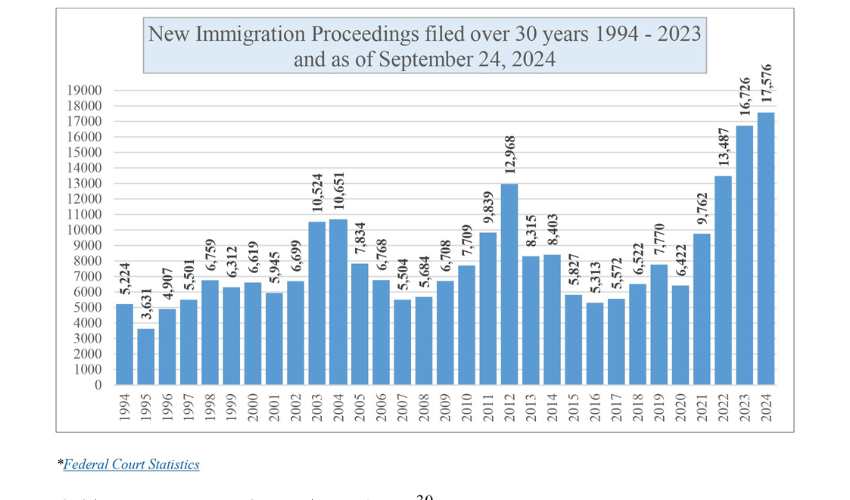New Study Permit Pilot Project Canada
On September 26, 2024, the Federal Court of Canada introduced a Study Permit Pilot Project Canada to reduce judicial review times for rejected study permits significantly. Effective October 1, 2024, this project aims to shorten the process from 14-18 months to 5 months. The project responds to record-high immigration filings, projected to reach 24,000 cases by the end of 2024—nearly four times the pre-pandemic annual average.
The pilot project allows simultaneous rulings on leave and judicial review requests without a hearing, saving time and court resources. Developed in collaboration with Immigration, Refugees and Citizenship Canada (IRCC) and key legal community members, the project ensures faster resolution for applicants. The applicant and IRCC must agree to participate and verify facts through a Simplified Certified Tribunal Record.
Federal Court Chief highlighted the advantages of this streamlined approach, noting that it benefits both applicants and the Court. The pilot project will significantly reduce delays, allowing students to join academic programs within six months instead of waiting up to three years.
This change is particularly relevant given the increasing Canada student visa rejection rate. High rejection rates have raised concerns for prospective students and educational institutions alike, as delays in approvals can deter talent from choosing Canada as a study destination. The Study Permit Pilot Project Canada project reflects Canada’s commitment to providing a fairer and faster review system, enhancing its appeal to international students seeking a seamless and transparent pathway.
How Study Permit Pilot Project Canada Addresses Student Visa Challenges?
The Study Permit Pilot Project Canada to streamline judicial reviews offers a critical pathway for students who face these rejection reasons. By allowing students to seek faster judicial review, Canada makes it easier for applicants to address errors or provide additional information for their cases. This approach has three key benefits:
- Improving Canada’s Appeal as a Study Destination: The faster resolution of rejected applications aligns with Canada’s goal to remain a top study destination, especially for qualified students who may be deterred by long wait times.
- Reducing Unnecessary Delays: The judicial review process, traditionally time-consuming, will now be shortened, offering applicants a more efficient way to resolve their cases. This efficiency helps students reapply quickly if required and ensures they don’t miss academic sessions due to prolonged review processes.
- Providing Greater Transparency and Fairness: The Study Permit Pilot Project Canada project enables a fairer process for applicants who may have experienced refusals due to minor errors or misunderstandings. This could lead to an increase in the student visa success rate as applicants have an opportunity to clarify any doubts or inconsistencies in their applications.
Rising Immigration Filings at the Federal Court of Canada (1994 - 2023)
Below is a graph depicting the increase in immigration filings, underscoring the need for the new Study Permit Pilot Project Canada project.

Understanding Canada’s Student Visa Rejection Rate
Despite Canada’s popularity as an educational destination, the Canada student visa rejection rate has fluctuated recently. Several factors, including the growing volume of applications and evolving immigration policies, impact this rate. In recent years, Canada’s immigration authorities have implemented stricter requirements, leading to higher rejection rates for applicants with incomplete documentation, questionable financial proof, or other common issues.
Canada has maintained a strong student visa success rate for well-prepared applicants. However, for those who experience rejections, understanding the Canada student visa rejection reasons is critical. Introducing the Study Permit Pilot Project Canada allows applicants to address these reasons promptly and avoid the long wait times, giving them a chance to fulfill their study aspirations in Canada with reduced procedural delays.
Canada Study Permit Rejection Reasons
The study permit application process is comprehensive, and several factors contribute to the Canada student visa rejection reasons. Common reasons for rejections include:
- Insufficient Financial Proof: Canadian immigration authorities require proof of sufficient funds to support tuition fees and living expenses. When applicants fail to meet these financial criteria, it is often grounds for rejection.
- Inadequate Ties to Home Country: Immigration officials assess whether applicants have sufficient motivation to return to their home country after completing their studies. If an applicant fails to demonstrate ties, such as family or career prospects, it may lead to refusal.
- Inaccurate or Incomplete Documentation: Missing documents, inaccurate information, or discrepancies between provided details and actual records often result in rejections. The application process demands high accuracy, as even minor errors can lead to significant consequences.
- Choice of Study Program: The study program chosen by the applicant must align with their academic and career background. If the program appears unrelated or does not support the applicant’s career goals, it can raise questions, resulting in rejection.
- Previous Travel or Visa Violations: Any history of violating immigration rules in Canada or other countries can increase the risk of study permit rejection. Canada’s immigration authorities take records seriously when assessing new applications.
- English Language Proficiency: Some applicants may not meet the language proficiency requirements, especially for English-speaking institutions. Low scores on English proficiency exams like IELTS or TOEFL may lead to rejection.
The Study Permit Pilot Project Canada project offers rejected applicants a faster avenue to address these issues, improving the Canada student visa success rate by allowing applicants to correct errors or misunderstandings promptly.
Tips For Increasing Success in the Study Permit Sucess Rate
Canada offers a high-quality education system, a diverse and inclusive society, and excellent post-graduation opportunities. These benefits make Canada an attractive study destination despite the challenges of the application process.
Immigration Consultant (RCIC) can play a crucial role in this process, providing expert guidance and ensuring all necessary documents are accurate, complete, and up-to-date, especially when proving financial stability. To increase the chance of success and avoid the pitfalls of common Canada study visa rejection reasons, prospective students should consider the following:
- Prepare a Complete and Detailed Application: Ensure all necessary documents are accurate, complete, and up-to-date, especially when proving financial stability.
- Provide supporting documents that establish reasons to return after completing studies, such as family ties, a job offer in your home country, or a business you plan to start or continue there.
- Choose a Relevant Study Program: Align your program with previous academic experience and future career goals to avoid questions about your intent to study in Canada.
- Improve Language Proficiency: Meeting the language requirements and scoring well on tests like IELTS, TOEFL, and TEF can improve chances of acceptance.
Canada’s Study Permit Rejections FAQs
What is the purpose of the Study Permit Pilot Project?
The Study Permit Pilot Project Canada project aims to reduce judicial review wait times for study permit refusals from 14-18 months to five months.
What are the main reasons for Canada’s high student visa rejection rate?
The primary reasons include insufficient financial proof, lack of ties to the home country, inaccurate documentation, and mismatched study programs. Language proficiency and past visa violations can also contribute to rejections.
How does Canada’s new pilot project help rejected applicants?
The pilot project provides hope for rejected applicants by expediting judicial reviews and reducing wait times from 12 months to five months. This enables applicants to address rejection issues and reapply sooner if necessary, providing much-needed relief.
How can applicants increase their success rate for Canada’s student visa?
Ensuring accurate documentation, solid financial proof demonstrated home ties, and choosing relevant study programs are proactive steps that can significantly improve the chances of approval. By taking these responsibilities seriously, applicants can increase their chances of getting a Canada student visa.
How long does it take to get a judicial review decision under the new project?
With the Study Permit Pilot Project Canada project, the review process for rejected study permits is expected to take around five months instead of the usual 12 months.
Does Canada’s high rejection rate impact its appeal as a study destination?
While a high rejection rate can be discouraging, initiatives like the pilot project are a testament to Canada’s commitment to maintaining its appeal as a study destination. By efficiently addressing rejection cases, the project reassures prospective students and maintains their confidence in Canada’s education system.
How does this benefit international students?
It allows for faster processing of rejected study permits, enabling students to join their programs without lengthy delays.
Who can participate in the pilot project?
Participation requires agreement from both the applicant and IRCC, with verification of facts through a Simplified Certified Tribunal Record.
How does the project impact Canada’s student visa rejection rate?
This streamlined review process helps applicants address rejection issues faster, potentially increasing the overall student visa success rate.
How Can We Help?
At Arnika Visa, we assist clients impacted by study permit refusals by providing expert guidance through the new streamlined judicial review process. Our team helps applicants understand Canada study visa rejection reasons, prepare comprehensive resubmissions, and navigate the Simplified Certified Tribunal Record criteria. With our personalized approach, clients can address issues efficiently, improving their chances of approval and reducing wait times under the new Study Permit Pilot Project Canada program. We prioritize up-to-date solutions to ensure swift and accurate representation in light of recent changes to Canada’s immigration policies.



